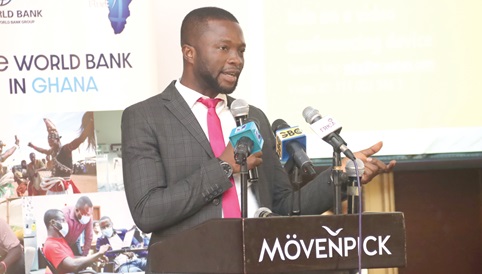
Taxman hunts for evaders - Ministry, GRA in massive taxpayer data clean-up
The Ministry of Finance is working with the Ghana Revenue Authority (GRA) to clean up data on taxpayers to ensure that more people are roped into the tax net.
Data indicates that while there are 7.4 million eligible taxpayers, just around 1.91 million are active, while about 5.4 million are inactive taxpayers and the rest dormant.
A Deputy Minister of Finance, Dr Alex Ampaabeng, who disclosed this in Accra yesterday, explained that the challenge had been identifying taxpayers and location of businesses, among others.
He was speaking at the launch of the 8th Ghana Economic Update put together by the World Bank. The bank publishes the updates with the goal of stimulating public discussions on the issues.
Update
The latest update, titled "Strengthening Domestic Revenue Systems for Fiscal Sustainability", focuses on domestic revenue mobilisation, identifying potential policy measures within Ghana's tax policy framework and compliance mechanisms, which could not only help macroeconomic stability, but also generate the necessary resources to support sustainable long-term growth.
The update is also to help generate consensus on critical reform areas and contribute to the dialogue on policy options to enhance macroeconomic management and accelerate progress towards long-term sustainable and inclusive growth.
Linkage
Dr Ampaabeng said with the clean-up, accurate data on taxpayers could be accessed and the digitalisation of addresses could help link their details to the Ghana Card. There has always been concerns about few and the same persons being chased by the GRA to pay taxes without expanding the tax net.
The Deputy Finance Minister said going forward, that conversation was going to change for the better with the steps being taken.
He said the country had to be responsible for its own destiny and the system being built was to ensure that the country had sustainable revenue.
Mid-year budget
Providing updates on the mid-year budget to be presented to Parliament today, Dr Ampaabeng reiterated assurances by the Ministry of Finance that it would not introduce new taxes.
Rather, he said, the budget would be about supporting businesses. The Programme Lead of the update, Stefano Curto, said significant efforts had been made by the government towards restoring macroeconomic stability, supported by an Extended Credit Facility (ECF) programme of the International Monetary Fund (IMF) and the World Bank’s Development Policy Operations.
Those, he said, included a firm monetary policy stance by the Bank of Ghana to combat inflation, reduce pressures on the exchange rate and build international reserves; a comprehensive debt restructuring and substantial fiscal consolidation to bring public debt back on a sustainable trajectory, and a series of structural reforms to support long-term growth.
Mr Curto said the macroeconomic situation had improved considerably over the last year due to the efforts made by the government.
Resilient
"Growth in 2023 was more resilient than projected, reaching 2.9 per cent. However, Gross Domestic Product (GDP) growth is projected to remain subdued in 2024 (3.1 per cent) because of the ongoing fiscal consolidation, macroeconomic uncertainty, elevated interest rates and inflation, and financial and energy sector weaknesses," he said.
Mr Curto, however, added that the medium-term outlook was subject to several downside risks that could derail the frail recovery being made. First, he said, spending pressures prior to this year’s elections might affect the government’s resolve on fiscal discipline.
Second, he mentioned delays in the external debt restructuring process which might increase the uncertainty surrounding the path to restore debt sustainability.
To achieve sustainable fiscal stability, Mr Curto said the country must enhance tax revenue mobilisation through robust measures and that improving tax efforts was not just a financial necessity, but a cornerstone for sustaining economic development.
Revenue mobilisation
High and sustainable revenue mobilisation, he said, facilitated better management of public finances and ensured that adequate investments were made in crucial infrastructural projects.
“Presently, Ghana’s tax revenue is notably lower compared to Sub-Saharan African peers and countries with similar income levels. This disparity reveals deep-rooted challenges within the tax policy and compliance mechanisms,” he said.
The report also pointed out that exchange rate pressures remained high in 2023, but inflation fell to half of 2022.
